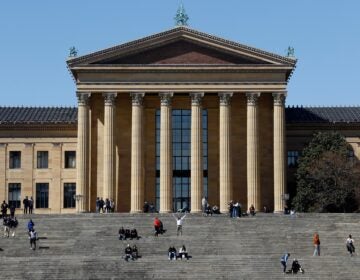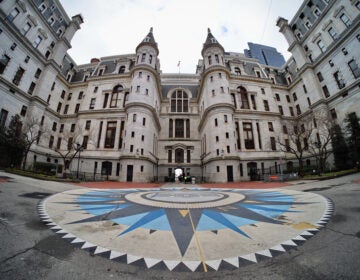Celebrating a Civil War hero at Laurel Hill
This New Year’s Eve marked the 195th birthday of General George Gordon Meade, Philadelphia’s Civil War hero who defeated Robert E. Lee at the Battle of Gettysburg.
On this day, the General Meade Society also sponsored a celebration of the life and legacy of General Meade at Laurel Hill Cemetery in East Falls. The event boasted a parade and a ceremony at the gravesite, followed by a reception at the cemetery gatehouse.
This year, about two hundred people attended the event. The attendees in period costumes came from all walks of life – some were military officers, some were members of hereditary societies, and some were ordinary Civil War buffs. Jack Lieberman, a retired naval officer who portrayed Commodore Percival Drayton at the ceremony, said that he and his colleagues prefer the term “living historians” to “re-enactors.”
“Many of the people you see in period attire do a particular character,” he said.
The master of ceremonies was Dr. Anthony “Andy” Waskie, a Temple professor and Civil War historian who serves as a “living historian” of General George Gordon Meade – he shares the general’s tall stature, dark beard, and commanding demeanor.
“He is Philadelphia’s greatest war hero,” Waskie asserted. “He saved the Union after only three days of fighting at Gettysburg.”
Waskie is also president of the General Meade Society (founded in 1996) and on the board of the Friends of Laurel Hill. Each year, the General Meade Society raises money for a scholarship that is awarded to a student from General George G. Meade Elementary School in South Philadelphia. The Society also raises money to fund the placement of markers and flagholders at every single veteran’s grave in Laurel Hill Cemetery.
This year, Meade family member Major Charles Meade sponsored a gravestone for General Meade’s mother Margaret Coats Butler Meade, whose final resting place had previously been unmarked. At the dedication, Meade reminded the audience that some of General Meade’s siblings married into Southern families and fought on the opposite side.
He also praised the crowd that turned up on this wintry day. “Nowhere else in the United States do we have such a large group of true patriots on this the final day of the year,” Major Meade declared.
The ceremony at General Meade’s grave site, which commands a sweeping view of the Schuylkill River and the Twin Stone Bridge, consisted of remarks by members of the General Meade Society, the Allied Order of the Grand Army of the Republic, and the Union League of Philadelphia.
Saluting a hero
The Philadelphia Brigade Band played the hymn “Eternal Father Strong to Save,” and 21 riflemen in period uniforms fired a salute. The assembled crowd then raised their glasses in a traditional champagne toast. General Meade was quite fond of French champagne both at the dinner table and on campaign.
The General Meade birthday celebration has become one of Laurel Hill’s most popular events, one that has grown steadily in attendance over the past twenty years.
For Civil War enthusiasts, this National Historic Landmark burial ground is a very rich resource indeed. “Here at Laurel Hill, we have more Civil War generals than other cemeteries,” said Director of Programs Gwen Kaminski, who also rang the gatehouse bell to open the ceremony.
A glance at the past
Philadelphia was a divided city during the Civil War, with many Southern sympathizers and “states rights” advocates among its leading citizens. Many had familial ties with Charleston, or had business interests in cotton and did not want to see trade disrupted. One prominent Philadelphian, General John C. Pemberton fought for the Confederacy out of loyalty to his Virginia-born wife.
General George Gordon Meade, however, took a stand against the Southern leanings of his home city by becoming one of the Union’s greatest generals. Born in Cadiz, Spain on December 31, 1815, Meade’s parents were native Philadelphians – his father was Irish-Catholic and his mother Anglican. He graduated from West Point in the middle of his class age at the age of 20. After fighting in the Mexican War, Meade found steady work designing lighthouses for the Army Corps of Engineers, including the one on Cape May.
When war broke out on April 11, 1861, he rejoined active duty and after two years of stalemate President Lincoln appointed him head of the Army of the Potomac. In July 1863, Meade engaged General Robert E. Lee in a showdown at Gettysburg, Pennsylvania. After three days of fighting and 60,000 casualties on both sides, Lee’s battered Army of Northern Virginia retreated across Confederate lines, and Meade halted a potentially devastating attack on Harrisburg or Philadelphia.
Despite this victory, President Lincoln never forgave Meade for failing to pursue Lee’s crippled army. During the remaining two years of the conflict, he was overshadowed by his successor General Ulysses S. Grant, and felt slighted as a result. Although typically reserved and modest, he had a notoriously bad temper; some of his troops called him “a damned old goggle-eyed snapping turtle.”
A man of deeds, not words
Nor did he curry favor with reporters. “Deeds, not words…that was his motto,” Waskie said. “He didn’t care about the press, and he didn’t have an entourage unlike other generals.” In fact, he irritated reporters so much that after Gettysburg they made an agreement to only print negative stories about him.
After Lee’s surrender at Appomattox, Meade returned to Philadelphia and was appointed a Fairmount Park Commissioner. He died of pneumonia and an old war wound on November 6, 1872. His funeral service took place at St. Mark’s Church near Rittenhouse Square, and his remains were interred at Laurel Hill Cemetery.
Meade’s epitaph reads: “He did his work bravely, and is at rest.”
2011 marks the sesquicentennial of the outbreak of the Civil War, and Laurel Hill will commemorate this anniversary with a series of programs, including an exhibition entitled “A House Divided: The Citizens, the Celebrated, and the Seditious of Civil War Philadelphia.”
WHYY is your source for fact-based, in-depth journalism and information. As a nonprofit organization, we rely on financial support from readers like you. Please give today.




